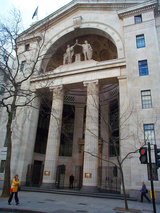BBC World Service
|
|
Bbcworldservice.jpg
Logo of the BBC World Service
The BBC World Service is one of the most widely recognised international broadcasters of radio programming, transmitting in 43 languages to around 150 million people throughout the world. The English service broadcasts 24 hours a day. Unlike the BBC's main radio and television services, which are primarily funded by a licence fee, the World Service is funded by the British Government through the Foreign and Commonwealth Office, although it remains politically neutral.
One of the primary purposes of the BBC World Service is to disseminate fair neutral news and information around the world. In many countries in the world the World Service is relied on as the only source of reliable news not manipulated by the local government.
| Contents |
Statistics and languages
According to [1] (http://www.thewhitefathers.org.uk/332web.html), the number of listeners per language breaks down as:
In Africa and the Middle East the service broadcasts to 42.5 million listeners, of which 14 million are in English.
Besides English, the BBC World Service broadcasts in Albanian, Arabic, Azeri, Bengali, Bulgarian, Burmese, Caribbean-English, Cantonese, Croatian, Czech, French, Greek, Hausa, Hindi, Hungarian, Indonesian, Kazakh, Kinyarwanda/Kirundi, Kyrgyz, Macedonian, Mandarin, Nepali, Pashto, Persian, Polish, Portuguese, Romanian, Russian, Serbian, Sinhala, Slovak, Slovene, Somali, Spanish, Swahili, Tamil, Thai, Turkish, Ukrainian, Urdu, Uzbek, and Vietnamese.
The German broadcasts were stopped in March 1999 after 60 years, as research showed that the majority of German listeners tuned into the English version. Broadcasts in Dutch, Finnish, French for Europe, Hebrew, Italian, Japanese and Malay were stopped for similar reasons.
History
The BBC's first shortwave transmissions were broadcast in 1925 from Borough Hill, Daventry. BBC shortwave programming began as BBC Empire Service on December 19, 1932, broadcasting particularly to Australia. It gained a special position in world broadcasting during the Second World War as it broadcast news to a wide range of audiences. It became known as the "World Service" in 1988.

After a landmine damaged the service's original home Broadcasting House on December 8 1940, the European Service moved to Bush House; the rest of the Overseas Service followed in 1958. When the BBC's lease on Bush House expires in 2008, the World Service plans to move back into Broadcasting House.
January 1941 saw the beginning of the Morse code letter "V" as an interval signal. The interval signal had several variations including timpani, the first four notes of Beethoven's Fifth Symphony (which coincide with the letter "V"), and electronic tones which are still in use today for some Western European services.
In August 1985, the service went off the air for the first time ever. Workers were striking in protest at the British government's decision to ban a documentary featuring an interview with Martin McGuinness of Sinn Féin.
Transmission
News and other programming from the BBC World Service is frequently relayed by local stations around the world, and it is regarded by some as the world's premier radio news source. In addition, the World Service provides educational, drama, and sports programming. A special use of the World Service has been emergency messages to British subjects abroad, such as the order to evacuate Jordan during the Black September incidents of September 1970.
The World Service uses a mediumwave transmitter at Orfordness to provide coverage to Europe, including on the frequency 648 kHz (which can be heard in the UK). Shortwave transmitters are located throughout the United Kingdom, Antigua, Ascension Island, Canada, the United States, Singapore, Cyprus, and other locations. In addition, the World Service provides specialist programming to the Caribbean and the Falkland Islands. Since the 1990s the World Service has also increasingly used satellite broadcasting as a means to deliver its signals to its overseas transmitters and to home dish owners in several countries. Because shortwave transmissions were not meeting BBC quality standards, transmissions directed to North America came to an end on July 1 2001. Users in this region are expected to use Satellite radio. Alternately, NPR carries World Service news broadcasts and shortwave transmissions to other regions can sometimes be heard. After British domestic radio station BBC Radio 4 ceases broadcasting at 1am British time, the World Service is broadcast on all Radio 4 frequencies overnight, including 198 kHz longwave which can be heard in parts of continental Europe.
Bbcworldservicetroops.jpg
The interval signal of the BBC World Service in English is the sound of the quarter-hour chimes of the Clock Tower of the Palace of Westminster (Big Ben). Its signature tune Lillibullero is broadcast just before the top of most hours, preceded by the announcement "This is London" and followed by the Greenwich Time Signal (five short and one long pips) and the hourly news. In other languages, the interval signal is three notes, pitched B-B-C. The exception is the non-English services to Western Europe, which have an interval signal of four notes, B-B-B-E, in the rhythm of the Morse Code letter "V". GMT is announced on the hour on the English service, e.g. "13 hours Greenwich Mean Time" is said at 1300 GMT. 0000 GMT is announced as "midnight Greenwich Mean Time".
In 1991 BBC World Service Television launched on satellite, split in 1995 into commercial stations BBC World and BBC Prime.
The World Service's output has recently been made more widely available in the UK - the service is now carried on DAB, Freeview and Sky Digital, as well as being available on 648MW in the south of the UK. Both a live stream and an archive of previous programmes are available worldwide on the Internet.
External links
- BBC World Service website (http://www.bbc.co.uk/worldservice/index.shtml)
- BBC World Service - Live streaming and programme archive (http://www.bbc.co.uk/radio/aod/domworldservice.shtml)
- Vernon Corea of the BBC (http://www.vernoncorea.info)Vernon Corea was an Ethnic Minorities Adviser to the BBC
- World Service clips and interval signals (http://www.vintagebroadcasting.org.uk/bbcws.htm)de:BBC World Service
